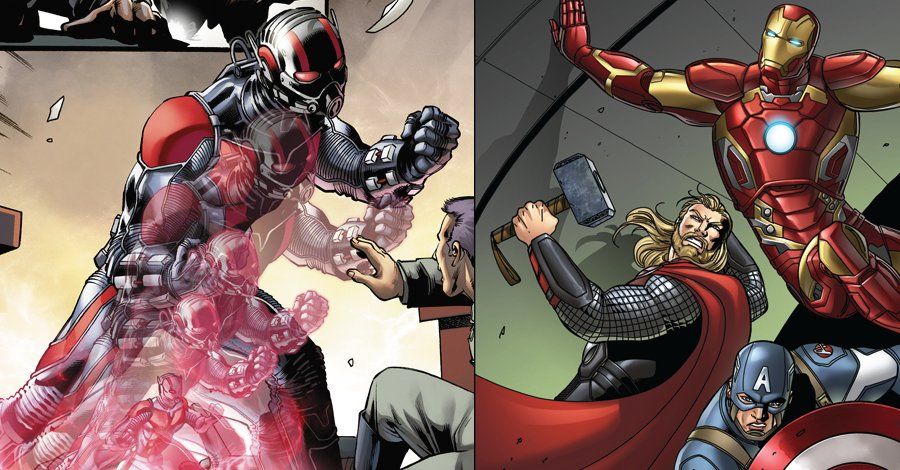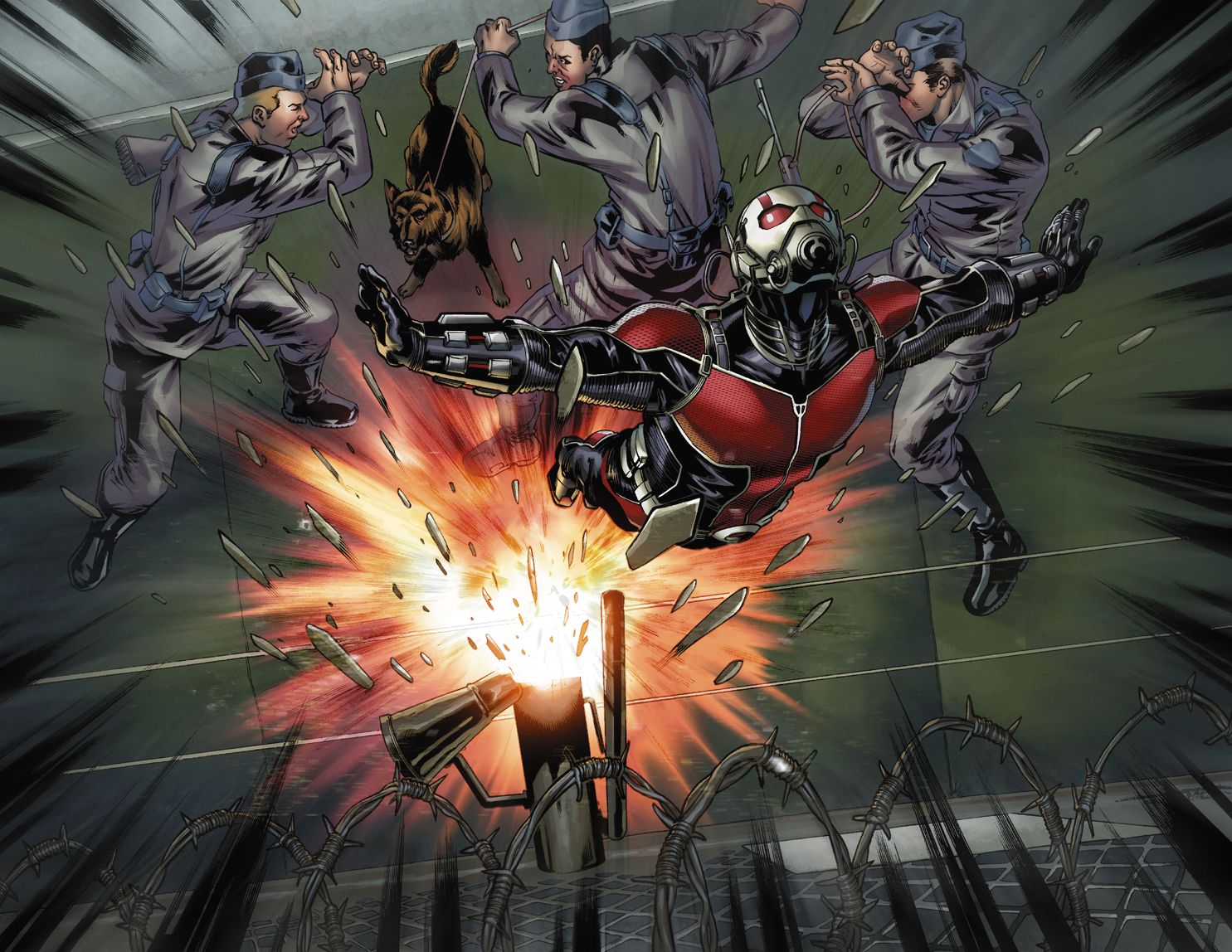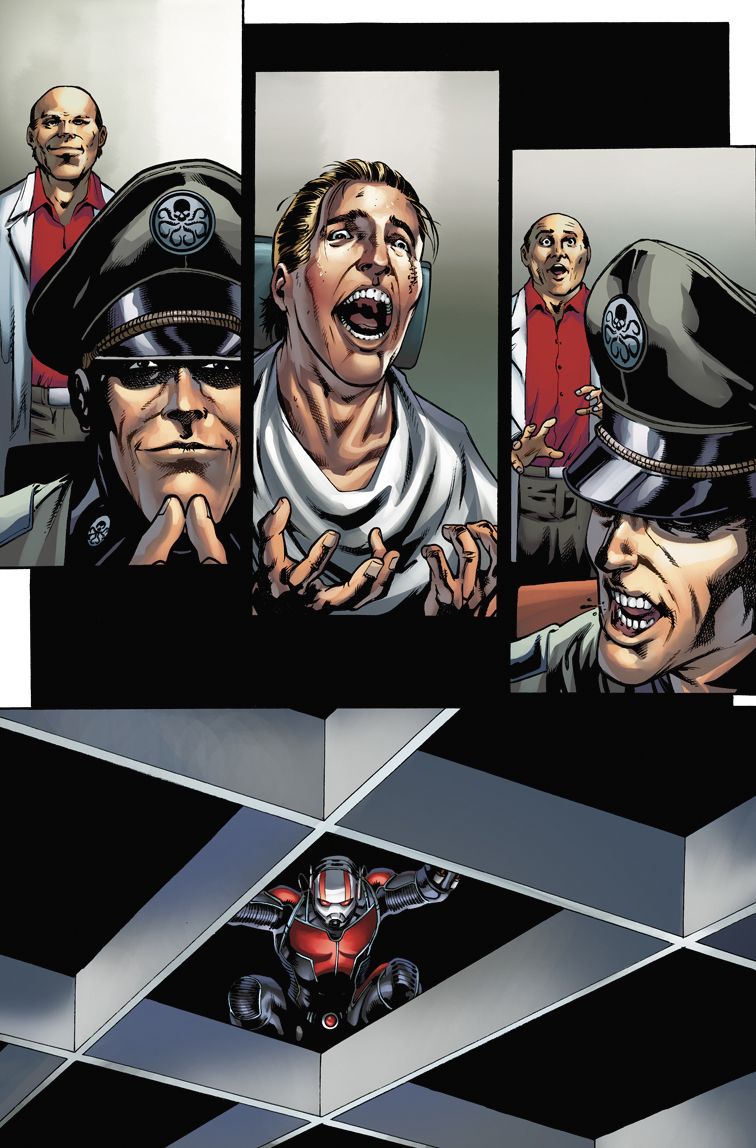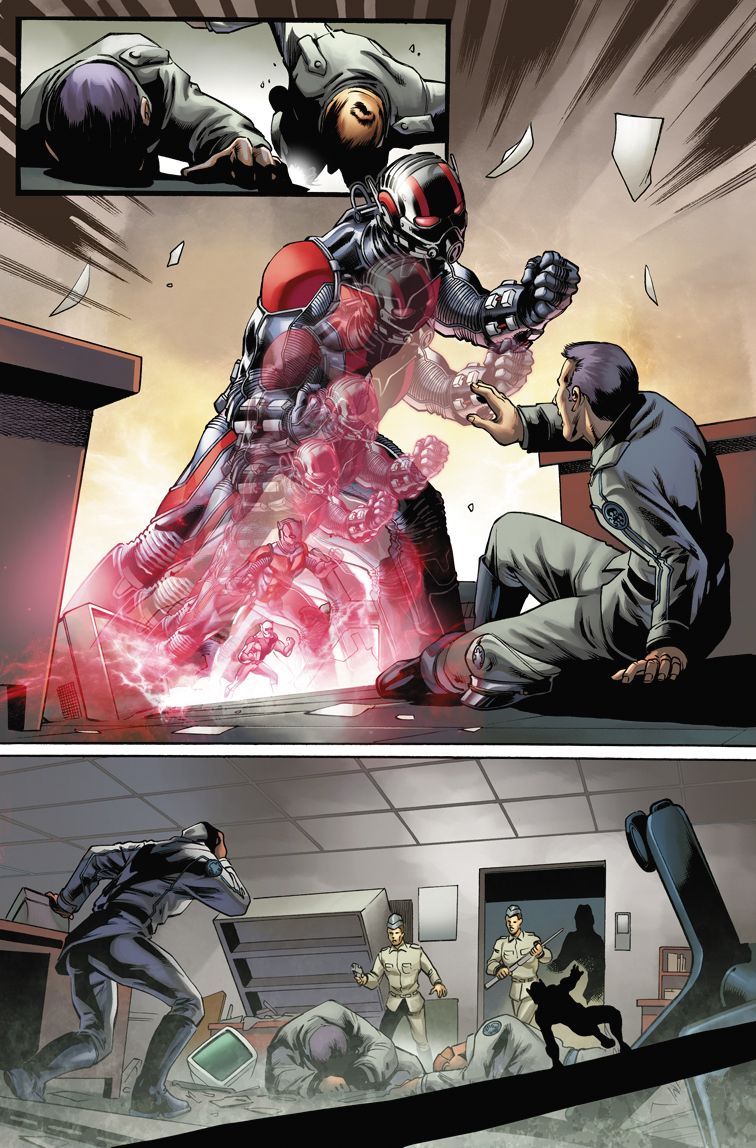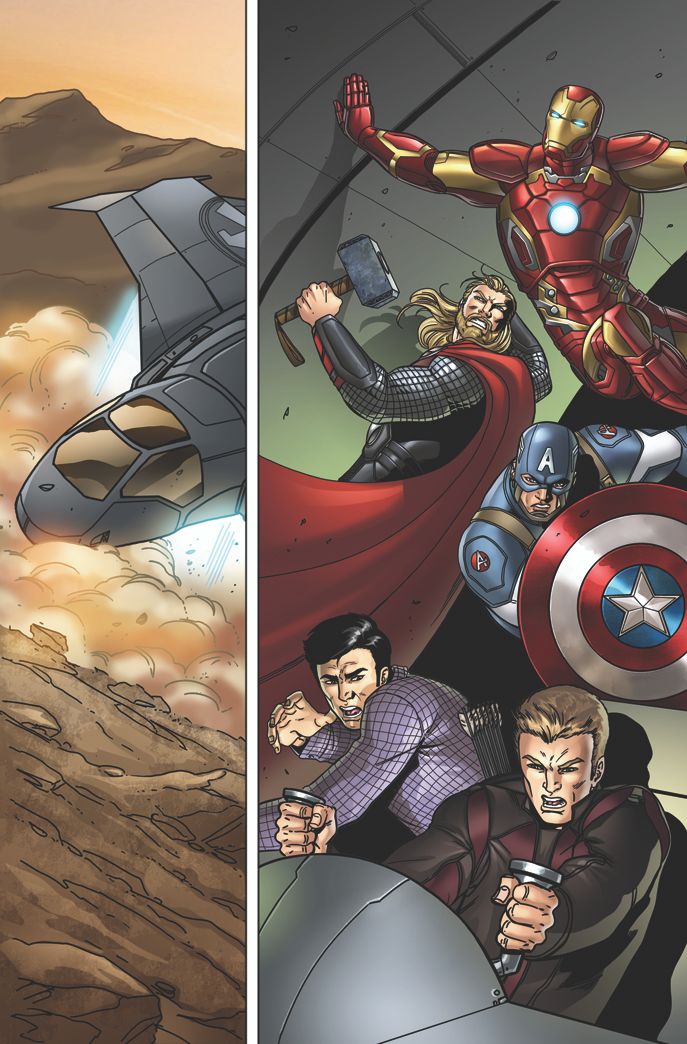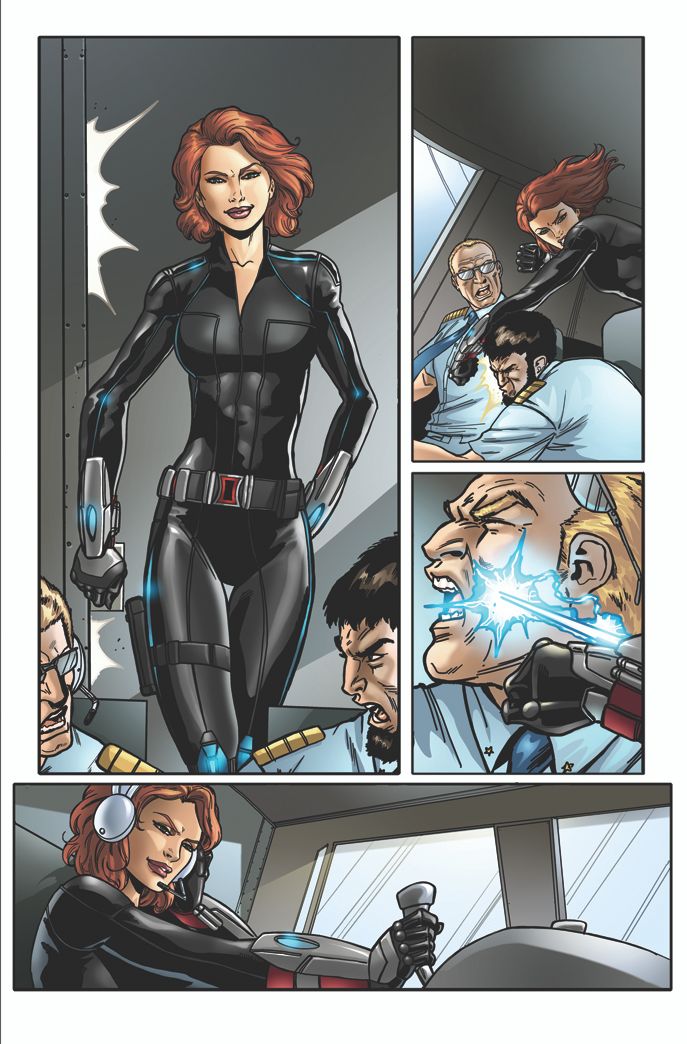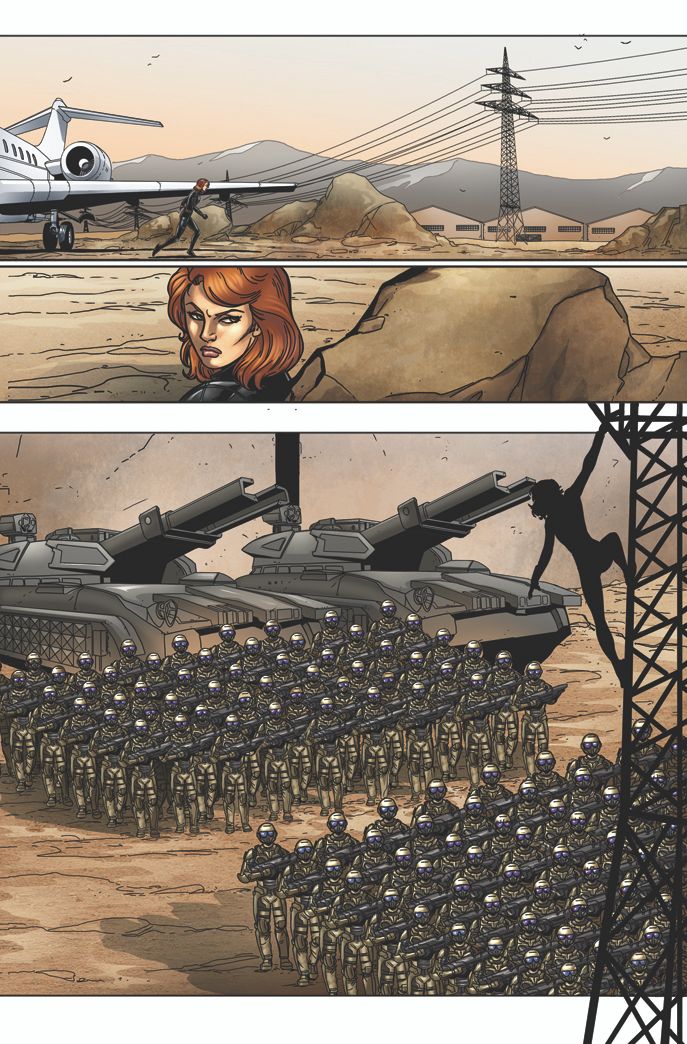For the production staff of Marvel Studios, comic books are more than just source material to adapt and inspire film and television projects. They're also a valuable storytelling tool that can expand the history of their interconnected universe and explore how their characters would react on some fun adventures that aren't necessarily integral to the history of the universe.
As a result, Marvel Studios and Marvel publishing have recently begun collaborating on a number of print and digital Infinite tie-in comics that expand the history of and play with the characters of the Marvel Cinematic Universe. These projects fill in gaps and extend personalities beyond the boundaries of the studios' twice annual films and various TV series.
One of the chief architects behind these collaborations is Will Corona Pilgrim. The writer is currently heading up the two-issue "Marvel's Ant-Man Prelude" series featuring art by Miguel Sepulveda as well as April's "Avengers: Operation Hydra" with artist Andrea Di Vito. CBR News spoke with Corona Pilgrim about the two titles, the differences between Marvel Cinematic Universe Prelude comics which are considered "in canon" for the MCU and other cinematic tie-in titles which are seen as "inspired by" the MCU, and his overall position at Marvel Studios.
CBR News: Will, before we get into your comic work I wanted to talk about your job with Marvel Studios, which I'm guessing is how you got involved with comics. The IMDB credits you as a "Creative Research" Assistant or Manager on all of the Marvel Studios films, and you're currently the Creative Director of Research & Development at Marvel Studios. What exactly does that entail?
Will Corona Pilgrim: It's pretty much what it sounds like to a layman. We're doing research and development for a comic book publishing company turned movie studio. We do a lot of adaptations, and we try to keep things as close to the comics as possible for the fans, which necessitated my job coming into existence.
I believe I was hired on literally the same day that Jon Favreau was signed to direct "Iron Man." So I've been here from the beginning. They knew they had a lot of research needs to kind of digest how many decades worth of comics we have to share with people who, especially at that time, had no idea about the comics' industry.
These days everybody knows Iron Man, but back then it was like, "This is a great Iron Man run." We were really pushing "Extremis" by Warren Ellis and Adi Granov. That's what also brought Adi onto the production. Those conversations about iconic comic runs were what ultimately brought me on to do that kind of research for all of the film projects on the slate.
So it started expanding from there. That kind of grew out into more roles. We always wanted to do the tie-in comics because I grew up a fan of the comics, and early on we pitched doing some. So once publishing asked us to do the adaptations and those kinds of things, they had me head that initiative with editorial. The editors I was working with at that time were Ralph Macchio and Alejandro Arbona. I was also working with Charlie Beckerman at one point.
A lot of the stuff we did were adaptations, but we really wanted to push tie-ins because we have so many great ideas in meetings as these films are developed. So there is stuff that for a lot of different reasons doesn't end up getting filmed, and we wanted to kind of go in that direction and show some of those things that we knew we were never going get to film.
One of our first ideas was trying to get the understanding of the post credits scene at the end of "Iron Man" where Tony Stark meets Nick Fury and at the end of "The Incredible Hulk" where General Ross meets Tony Stark. At the time no one really understood that connection. So on that tie-in we worked with a writer, Justin Theroux, who was writing "Iron Man 2" at the time, to plot a little prelude type story that showed where all that started.
Stark and Ross already had some familiarity at that point, and we wanted to see where that kind of tense nature came from. That became our first real tie-in/prelude type story. Of course we've done many more since them.
What's it like writing these preludes?
It's a dream come true. [Laughs] Working on these projects as a fan is great. First, getting to see them adapted and then getting to write dialogue in the movie characters' voices. My favorite part is just writing out the ideas and seeing an artist come back with something even more spectacular than I'd imagined.
You never think it's possible until it happens. You write a sentence and you say, "I think this will be cool." Then your artist says, "No, this would be cool." And they show you something so much better than you imagined. It's so rewarding on so many levels.
So the appeal of writing these books is getting to play with all these characters you love, the chance to tell imaginative stories, and the collaboration with an artist?
Absolutely. The collaboration is my favorite part, especially because that's how I was introduced to this process. I don't write in a vacuum. A lot of the executives - as well as the producers and the co-producers, and of course Kevin Feige and Lou Esposito - have their thoughts on what would be good stories. That's how we ended up having the wonderful Marvel One-Shots shorts program. All these different pieces of our canon continuity were all feeding off of each other.
So as we were having these great meetings we were coming up with different ideas. I was there jotting down little things that I thought would make for great comics that we could do later.
Over this last year that really started to pick up steam. We got Dan Abnett and Andy Lanning to write the "Guardians of the Galaxy" tie-in! That was a major get. We threw their names out there because we knew of their run, and we were so inspired by it. James Gunn was a big fan too. So we floated the idea to the editors at Marvel Publishing who approached them and they said yes! The editor at the time was Bill Rosemann who was their editor on the original series. So I thought it would be a no-brainer, but it turned out to be a wonderful match made.
We got to do a great Nebula story. A lot of fans of Nebula came after the movie, but before it came out you got to see a little more of what she was all about. We got to do so much cool stuff.
So essentially writing comic stories of the Marvel Cinematic Universe is just like writing stories for any shared universe. You find a spot where there's room to tell an organic story in between what every one else is doing.
Absolutely, and it's a fine line too. We were trying to work out a Captain America story early on with Fred Van Lente. He was explaining these big, bombastic scenes, and we were trying to explain the actual mechanics of the world. We'd tell him that something wouldn't exist in the actual MCU version of Captain America and he'd reply, "But this is comics! We can do anything!" Later on he would skillfully describe the experience as, "making comics on a budget." [Laughs] Just like what we have to do on the movie side.
It's the idea that there are realistic parameters on what can be put in a story and why in the context of these stories. We want to have a lot of fun action and great visuals. The powers allow us to do that and you have the great costumes, but we also want to tell what we consider really important stories or at least worthwhile stories of the in-between.
In the same way we showed Tony Stark meeting General Ross there's some significance in the "Ant-Man Prelude" that kind of leads into a greater shared cinematic universe that we work so hard to keep coherent with all these spin-offs, tie-ins, TV shows, one-shots, and comics. We definitely want our stories to feel part of that universe, but we want to have some fun and tell a great comic story.
Let's talk a little more about the "Ant-Man Prelude." For this story I understand you're giving us a tale of the Hank Pym Ant-Man, played by Michael Douglas in the upcoming film, in his prime. When does this story take place? And how similar and how different is the MCU Hank to his Marvel Universe counterpart?
The time period it takes place in is generally about the mid '80s. We don't have a specific time stamp because we tend not to do that in the MCU, but it' definitely around the time when Gorbachev was the leader in Russia. There's definitely a Berlin Wall, which plays a large role in the story because Hank's mission in the comic is to get through the Berlin Wall and get into East Berlin; just off the Death Strip is where he needs to get to. They need to do it covertly too, which is not an easy task at that time.
So that's kind of where in history and where in our world the story is. As far as the differences between the film Hank and the comic, I can't really get into too much of that.
It is him in his prime, though. It's a younger Hank Pym, and it's kind of what will lead to him finding and working with Scott Lang later on. We wanted to see an adventure of Hank at that age. So we can understand that back story and thought process of someone who was the Ant-Man and understands that world, especially the Particle, and how that plays into the complexities and problems of having such technology will ultimately lead to in the film.
So in terms of story and tone the "Ant-Man Prelude" is sort of a spy thriller?
It's a spy action story. There are some thriller elements, but it's definitely a spy story. You're going to see some really cool shots of the Ant-Man suit in action. Miguel Sepulveda just knocks it out of the park.
Miguel has worked on a variety of different Marvel Universe super heroes and he's drawn Ant-Man before. What's it like seeing him bring to life the more grounded world of the Marvel Cinematic Universe?
He makes talking scenes interesting. [Laughs] He gives the characters in those dialogue heavy scenes a sense of energy. His pencils are so great that every time you go through a page of talking, he finds a way to give you a big panel that makes you go, "Yeah! That's why I'm reading a comic book!" It's never just talking heads with Miguel.
We've talked about Hank, let's touch upon some of the other cast members in the "Ant-Man Prelude." What can you tell us about them?
S.H.I.E.L.D. is involved, and if you're watching a certain TV show right now you might be familiar with certain players in S.H.I.E.L.D. [Laughs] That's about as far as I can go.
Let's move to the other MCU tie-in comic you have coming out, "Avengers: Operation Hydra." This isn't your first comic that takes place before the upcoming "Avengers Age of Ultron" film and starring Hydra, correct?
Correct. It can be confusing, and having my name on the different comics doesn't help matters, but we have "canon" comics that are considered official MCU canon stories. Then we have other comics that we consider more "inspired by."
The canon ones have that Marvel stamp and the trade dress has a cinematic wide screen feel. Whereas the inspired tie-ins are much more about having another fun adventure with the Avengers. They're not considered canonical though. Those are just fun adventures with the team because we want to tell more Avengers stories.
Things like this, the "Captain America: Homecoming" story we just did, and the "Guardians of the Galaxy" one I wrote, "Galaxy's Most Wanted," are fun adventures where we get to show off all the characters from the film in costume and in comic form. They don't really have a concrete place in the MCU timeline though.
So the "Avengers: Age of Ultron Prelude - This Sceptre'd Isle" Infinite Comic you did with Baron Strucker is considered in canon?
Yes that's considered in canon. It's part of the wonderful timeline I mentioned earlier where we are spinning all these plates and trying to keep from dropping any of them.
What's sort of the status of the Avengers when "Operation Hydra" begins? Have they reunited? Because at the end of the feature film the team sort of went their separate ways.
They did go their separate ways, but as Fury so wonderfully states, "They'll come back together because we'll need them to." That's very much their status in "Age of Ultron." Any time you bring the Avengers together it's a very big deal.
In things like "Item 47" we learned part of the fallout from the Battle of New York was that a lot of the Chitauri tech ended up in not so great hands. Then the fallout of "Captain America: The Winter Soldier" reveals that Hydra is still around. So you put two and two together and you have Hydra cells out there sneaking around picking up Chitauri tech when they can and reverse-engineering it or obtaining pieces that were previously reverse-engineered by S.H.I.E.L.D.
They're stirring up a lot of trouble. So the Avengers have become kind of a clean up crew. They feel it's their responsibility to clean up anything Chitauri related, and that's what "Operation Hydra" is about. It's about the team going up against one of those cells.
The story also focuses in on Hawkeye's relationship with the team. Because everyone makes that joke of him just being a guy with a bow and arrow. Matt Fraction explores that wonderfully in the Marvel Universe with his "Hawkeye" series, and in this we get to see more about that in the MCU.
Right, so far it seems like we saw more of him being an opponent of the Avengers than a member since he spent a good chunk of the first film as one of Loki's mind controlled enforcers.
Absolutely. And he's very much a part of the team at this point. There's no Loki mind control working on him.
So is Hawkeye our primary P.O.V. character in "Operation Hydra?"
It's not entirely from his point of view, but it definitely is from his perspective at a certain point. He's the through-line.
How much fun did you have building your own threat for the Avengers? Seems like you could run wild with the combination of Hydra and alien technology.
That again was part of the fun of the collaboration. Just writing the words "Chitauri" and "Hydra," then sending it to Mark Basso, the current editor, and asking him who the artist was, and discovering that it was Andrea Di Vito again. It was like, "Oh, okay! It's going to be awesome then!"
Andrea then came back with some fantastic depictions of what it would look like if Hydra got their hands on Chitauri weaponry and what they would turn that tech into. It's a lot of bombastic action.
Finally, who are some of the other characters that will become embroiled in the Avengers battle with Hydra?
If they have an association with the Avengers it's definitely possible that a character might peek their head up in some panels here and there. There's a page that shows where all the Avengers are while they're waiting to get the call to let them know that they have a mission. So you get to see all those characters with their "people" as I will say.
I want to conclude by saying I hope the fans are loving our tie-ins. The more they love them the more we'll make them. We're happy to make them. I'm more than happy to write them or at least be part of the whole process. It's a case of, "Make Mine Marvel Studios!" [Laughs] "Make Mine MCU!"
"Marvel's Ant-Man Prelude" and "Avengers: Operation Hydra" arrive soon as Marvel Infinite Comics.

